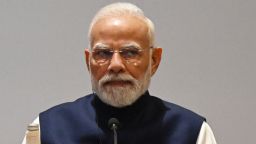India Denies Trump’s Claim on Russian Oil Imports Amid Tensions

India has publicly pushed back against claims made by former US President Donald Trump regarding its oil imports from Russia. On October 4, 2023, Trump stated that Indian Prime Minister Narendra Modi had assured him that India would cease purchasing oil from Russia, which is currently under US sanctions. This assertion, described by Trump as a “big step,” has been met with skepticism from New Delhi.
On October 5, India’s foreign ministry spokesperson Randhir Jaiswal addressed the media, stating he was “not aware of any conversation” between Trump and Modi regarding such an assurance. The spokesperson emphasized India’s status as a “significant importer of oil and gas,” without directly referencing Russia or Trump’s claims. He further noted, “Ensuring stable energy prices and secured supplies have been the twin goals of our energy policy.”
India has maintained a close relationship with Russia, particularly in the energy sector. The country is set to host Russian President Vladimir Putin later this year and has emerged as one of the largest purchasers of Russian oil since Moscow’s invasion of Ukraine in 2022. As sanctions against Russia intensified, oil prices fluctuated significantly, prompting India to continue its imports to meet the demands of its booming economy, which supports a population exceeding 1.4 billion people.
Over the past year, Trump’s administration has urged India to abandon its Russian oil imports, suggesting that sanctions should be enforced globally. In August 2022, Trump announced a 25% tariff on Indian imports of Russian oil and gas, signaling increasing pressure on New Delhi.
According to Muyu Xu, a senior oil analyst at trade intelligence firm Kpler, halting oil imports from Russia is not a feasible option for India. Xu highlighted that Russia supplies approximately 1.7–1.8 million barrels of oil per day, making it challenging for India to replace such volumes quickly. “I don’t think India can stop buying Russian oil overnight. The volumes are simply too large,” Xu stated, noting that differences in crude quality complicate any potential substitutions.
Data from Kpler reveals fluctuations in Indian purchases of Russian oil. For instance, the state-owned Indian Oil Corporation Limited imported 10.35 million barrels in January 2023, but this figure dipped to 4.62 million barrels by September. In October, the corporation had already imported 7.03 million barrels. CNN has reached out to Indian Oil Corporation Limited for insights on its future purchasing strategies concerning Russian oil.
Prime Minister Modi’s resistance to US pressure aligns with his political branding as a strong leader focused on India’s interests in the international arena. Recently, officials from New Delhi and Washington have engaged in diplomatic discussions aimed at mending their relationship, with trade delegations working towards a potential agreement.
Earlier this month, Indian Foreign Minister S. Jaishankar acknowledged existing tensions with the United States, attributing much of the friction to unresolved trade negotiations. He expressed that both countries “have not arrived at a landing ground for our trade discussions” but reaffirmed India’s commitment to actively finding solutions. “Those issues need to be negotiated and discussed and resolved, which is exactly what we are trying to do,” Jaishankar stated, reflecting India’s strategic approach towards balancing its international energy needs and diplomatic relations.






